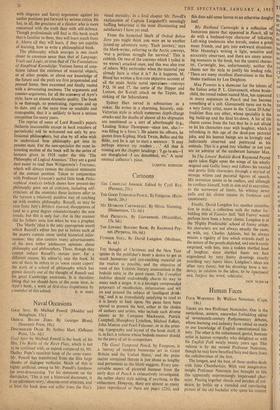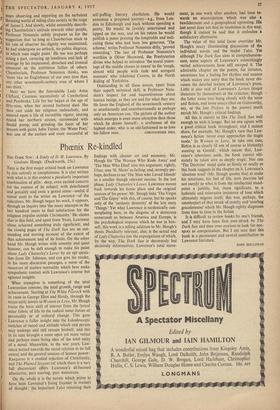Human Faces
POUR WORTHIES. By Wallace Notestein. (Cape, 18s.) THERE are two Professor Notesteins. One is the meticulous, austere, somewhat forbidding editor of seventeenth-century Parliamentary debates, whose learning and industry have added so much to our knowledge of English constitutional his- tory. The other is the unbuttoned, genial, humane artist in human sympathy who delighted us with his English Folk nearly twenty years ago. This volume is by the second Professor Notestein, though he may have benefited here and there from the collaboration of the first.
The longest, and the best, of these studies deals with John Chamberlain. With rare imaginative insight Professor Notestein has brought to life this apparently unpromisingly impersonal char- acter. Piecing together shreds and patches of evi- dence, he builds up a rounded and convincing picture of the old bachelor who spent his mature years observing and reporting on the turbulent thrusting world of ruling-class society in the reign of James L And slowly, whilst ostensibly describ- ing Chamberlain's attitude towards other people, Professor Notestein subtly prepares us for the suggestion that 'so long as Chamberlain stuck to his role of observer his dignity was maintained, he had undergone no setback, no public disgrace, to which men might point.' He too was perhaps acting a part, covering up loneliness and lack of courage by his impersonal, detached and ironical comment on the ambitious follies of others. Chamberlain, Professor Notestein thinks, was 'more like an Englishman of our own time than any other seventeenth-century man of whom I can think.'
Next we have the formidable Lady Anne Clifford, Countess successively of Cumberland and Pembroke. Life for her began at the age of fifty-nine, when her second husband died. She then cast aside her religious melancholy, and entered upon a life of incredible vigour, touring round her northern estates, surrounded with feudal pomp, and grinding the faces of her tenants with gusto. John Taylor, the 'Water Poet,' was one of the earliest and most successful of self-puffing literary charlatans. He would announce a proposed journey—e.g., from Lon- don to Edinburgh and back without spending a penny. He would be lavishly entertained. and tipped on the way, and on his return he would publish a poem praising the hospitable and indi- cating those who had been less generous. 'The scheme,' writes Professor Notestein drily, 'proved rewarding.' The last of Professor Notestein's worthies is Oliver Heywood, the Presbyterian divine who helped to introduce 'the moral yearn- ings of the middle classes in towns' to the 'rough, almost wild people with rude and arrogant manners' who inhabited Craven, in the North Riding of Yorkshire.
Outstanding in all these essays, apart from their superb technical skill, is Professor Note- stein's respect for and inquisitiveness- about human beings, as they are and for what they are. He loves the England of the seventeenth century as unashamedly and unembarrassedly as perhaps only an American can. The picture of the author which emerges is even more attractive than those which he draws himself : a craftsman of the highest order, who is so old-fashioned as to love















































 Previous page
Previous page